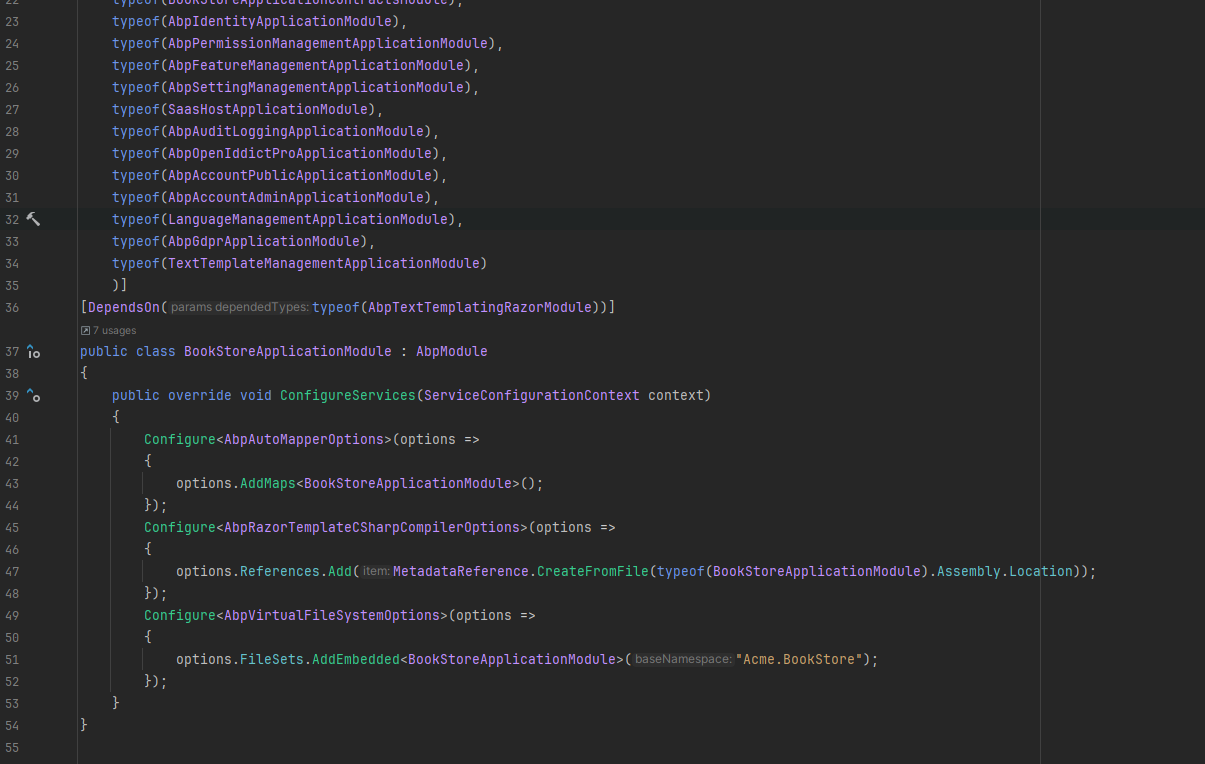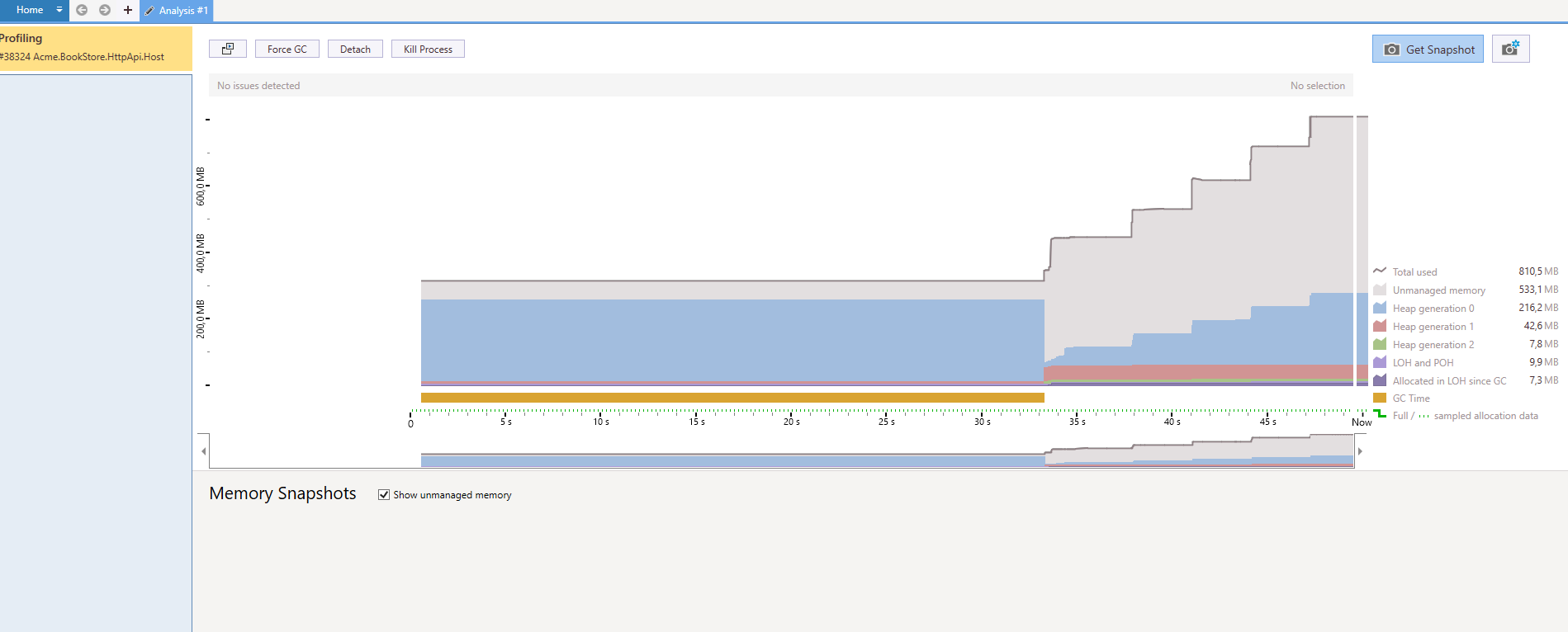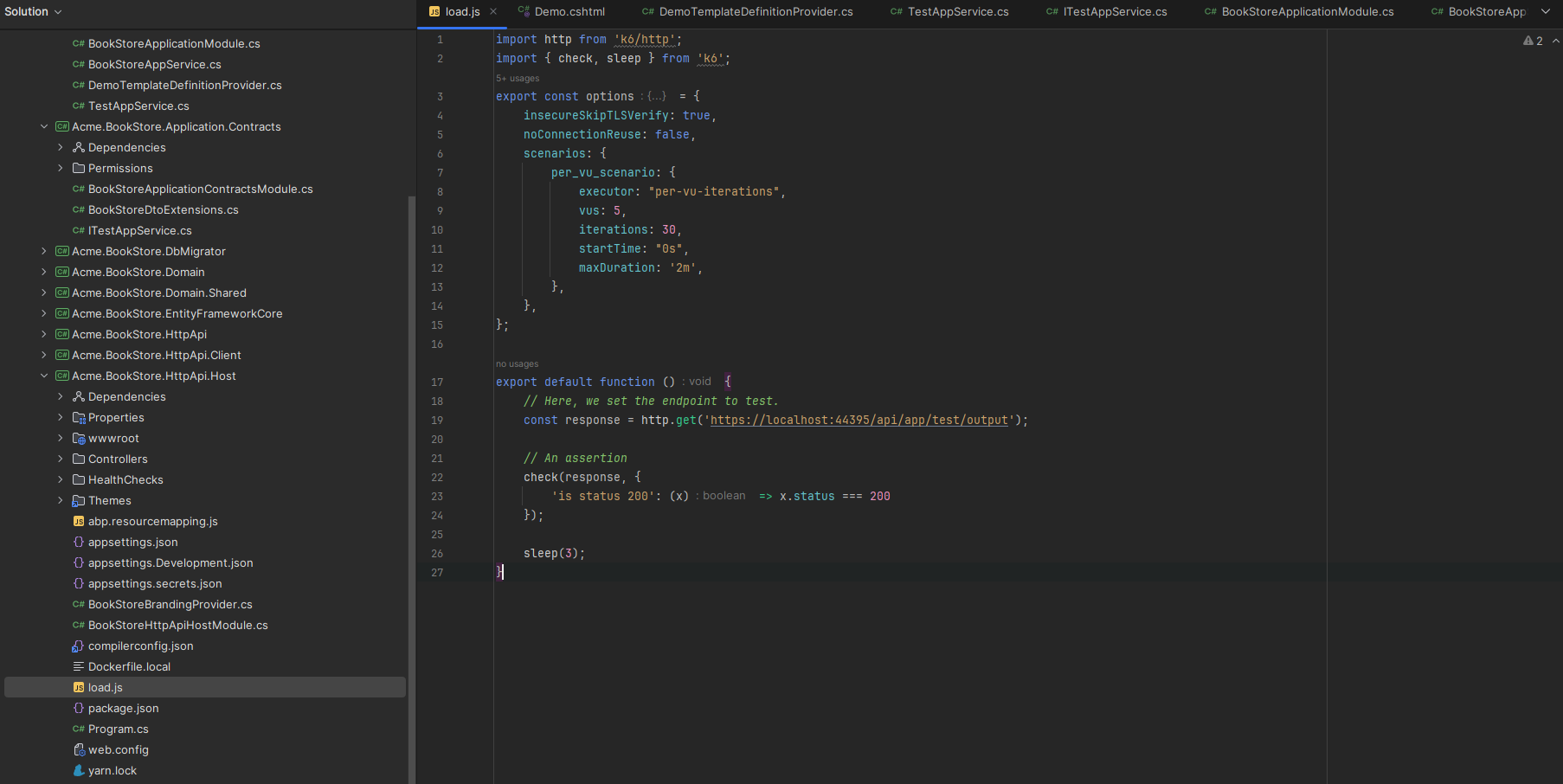- ABP Framework version: v7.4.0
- UI Type: No Ui
- Database System: EF Core (SQL Server, Oracle, MySQL, PostgreSQL, etc..)
- Tiered (for MVC) or Auth Server Separated (for Angular): no
Hello, I think razor text templating have a memory leak. And i suppose it is sth. with caching. To produce the problem here are the steps, I can also send a sample app for this.
- create a new app with abp cli.
abp new Acme.BookStore -u none -csf - then add Volo.Abp.TextTemplating.Razor module with cli. I added this inside application module but you can add it wherever you want.
abp add-package Volo.Abp.TextTemplating.Razor - Then create a model for the template I have added a model that takes a list. here it is.
public class Command
{
public bool ReportIndicate { get; set; }
public string CommandId { get; set; }
public string MoCmd { get; set; }
public MoSequence MoSequence { get; set; }
public Command()
{
}
public Command(bool reportIndicate, string commandId, string moCmd, MoSequence moSequence)
{
Check.NotNullOrWhiteSpace(commandId, nameof(commandId));
Check.NotNullOrWhiteSpace(moCmd, nameof(moCmd));
Check.NotNull(moSequence, nameof(moSequence));
ReportIndicate = reportIndicate;
CommandId = commandId;
MoCmd = moCmd;
MoSequence = moSequence;
}
}
public class MoSequence
{
public List<Mo> MoList { get; set; }
public MoSequence()
{
MoList = new List<Mo>();
}
public void AddMo(string moPath, string moValue)
{
MoList.Add(new Mo(moPath, moValue));
}
public void AddMo(string moPath)
{
MoList.Add(new Mo(moPath));
}
}
public class Mo
{
public string MoPath { get; set; }
public string MoValue { get; set; }
public Mo()
{
}
public Mo(string moPath)
{
MoPath = moPath;
}
public Mo(string moPath, string moValue)
{
MoPath = moPath;
MoValue = moValue;
}
}
- Now create a template for the command model. here you can find it.Add it as an embedded resource
@inherits Volo.Abp.TextTemplating.Razor.RazorTemplatePageBase<Acme.BookStore.Models.Command>
<srm:COMMAND>
<srm:REPORT_INDICATE>@(Model.ReportIndicate ? "true" : "false")</srm:REPORT_INDICATE>
<srm:COMMAND_ID>@Model.CommandId</srm:COMMAND_ID>
<srm:MO_CMD>@Model.MoCmd</srm:MO_CMD>
<srm:MO_SEQUENCE>
@foreach (var item in Model.MoSequence.MoList)
{
<srm:MO>
<srm:MO_PATH>@item.MoPath</srm:MO_PATH>
@if (item.MoValue != null)
{
<srm:MO_VALUE>@item.MoValue</srm:MO_VALUE>
}
else
{
<srm:MO_VALUE />
}
</srm:MO>
}
</srm:MO_SEQUENCE>
</srm:COMMAND>
- Create a TemplateDefinitionProvider.
public class DemoTemplateDefinitionProvider : TemplateDefinitionProvider
{
public override void Define(ITemplateDefinitionContext context)
{
context.Add(
new TemplateDefinition("Demo") //template name: "Demo"
.WithRazorEngine()
.WithVirtualFilePath(
"/Template/Demo.cshtml", //template content path
isInlineLocalized: true
)
);
}
}
- Add Configuration to your module
public override void ConfigureServices(ServiceConfigurationContext context)
{
Configure<AbpAutoMapperOptions>(options =>
{
options.AddMaps<BookStoreApplicationModule>();
});
Configure<AbpRazorTemplateCSharpCompilerOptions>(options =>
{
options.References.Add(MetadataReference.CreateFromFile(typeof(BookStoreApplicationModule).Assembly.Location));
});
Configure<AbpVirtualFileSystemOptions>(options =>
{
options.FileSets.AddEmbedded<BookStoreApplicationModule>("Acme.BookStore");
});
}
 7) Create an appservice that will return the output.
7) Create an appservice that will return the output.
public class TestAppService : BookStoreAppService, ITestAppService
{
private readonly ITemplateRenderer _templateRenderer;
public TestAppService(ITemplateRenderer templateRenderer)
{
_templateRenderer = templateRenderer;
}
public async Task<string> GetOutput()
{
var moSequence = new MoSequence();
moSequence.AddMo(".MO.MONITOR_OPERATION.BOOTSTRAP.DEV_CODE", "105");
moSequence.AddMo(".MO.MONITOR_OPERATION.BOOTSTRAP.DEV_TYPE", "SPLAYER" + Random.Shared.Next().ToString());
moSequence.AddMo(".MO.MONITOR_OPERATION.BOOTSTRAP.DEV_MDNM", "QB13R");
var command = new Command(false,
"31470ade5bc2fd42-60c7af5-4725-8703-33dd729f63cea7aa5e4fbc0e",
".MO.MONITOR_OPERATION.BOOTSTRAP",
moSequence);
var result = await _templateRenderer.RenderAsync(
"Demo", //the template name
command
);
return result;
}
}
- Now you should be able to hit the endpoint. and it should return sth similar like this.
<srm:COMMAND>
<srm:REPORT_INDICATE>false</srm:REPORT_INDICATE>
<srm:COMMAND_ID>31470ade5bc2fd42-60c7af5-4725-8703-33dd729f63cea7aa5e4fbc0e</srm:COMMAND_ID>
<srm:MO_CMD>.MO.MONITOR_OPERATION.BOOTSTRAP</srm:MO_CMD>
<srm:MO_SEQUENCE>
<srm:MO>
<srm:MO_PATH>.MO.MONITOR_OPERATION.BOOTSTRAP.DEV_CODE</srm:MO_PATH>
<srm:MO_VALUE>105</srm:MO_VALUE>
</srm:MO>
<srm:MO>
<srm:MO_PATH>.MO.MONITOR_OPERATION.BOOTSTRAP.DEV_TYPE</srm:MO_PATH>
<srm:MO_VALUE>SPLAYER737483572</srm:MO_VALUE>
</srm:MO>
<srm:MO>
<srm:MO_PATH>.MO.MONITOR_OPERATION.BOOTSTRAP.DEV_MDNM</srm:MO_PATH>
<srm:MO_VALUE>QB13R</srm:MO_VALUE>
</srm:MO>
</srm:MO_SEQUENCE>
</srm:COMMAND>
- Now you need to call this endpoint with some frequency so you can see what is going on in memory. I have used dotMemory and k6 for it. here is my k6 .js file
import http from 'k6/http';
import { check, sleep } from 'k6';
export const options = {
insecureSkipTLSVerify: true,
noConnectionReuse: false,
scenarios: {
per_vu_scenario: {
executor: "per-vu-iterations",
vus: 5,
iterations: 30,
startTime: "0s",
maxDuration: '2m',
},
},
};
export default function () {
// Here, we set the endpoint to test.
const response = http.get('https://localhost:44395/api/app/test/output');
// An assertion
check(response, {
'is status 200': (x) => x.status === 200
});
sleep(3);
}
- if you run this js file from command line tool.
k6 run load.js
and check the memory spike in dotmemory you will see sth similar like this.

I analyze this with dotnet-dump and dotmemory. It has lots of free memory in unmanaged memory heap. mostly strings. I didn't check the source code. It could be sth wrong from caching so it caches the same thing in every request, but not sure, didn't deep dive into it.
If i switch to Volo.Abp.TextTemplating.Scriban, this doesn't happen and you can see the memory steady, no spikes. I switch to scriban and change all my templates with it. Hope i could clarify the problem if you need a sample app i can send it if you give an email address.
5 Answer(s)
-
0
hi
Please share your test app, Thanks
liming.ma@volosoft.com
-
0
Hello, I have sent it to you.
-
0
Thanks. I will check it asap.
-
0
hi
using System; using System.Collections.Concurrent; using System.Collections.Generic; using System.IO; using System.Linq; using System.Reflection; using System.Threading; using System.Threading.Tasks; using Microsoft.AspNetCore.Razor.Language; using Microsoft.CodeAnalysis; using Microsoft.Extensions.Options; using Nito.AsyncEx; using Volo.Abp; using Volo.Abp.DependencyInjection; using Volo.Abp.TextTemplating; using Volo.Abp.TextTemplating.Razor; namespace Acme.BookStore; [Dependency(ReplaceServices = true)] [ExposeServices(typeof(IAbpCompiledViewProvider))] public class MyAbpCompiledViewProvider : IAbpCompiledViewProvider, ITransientDependency { private static readonly ConcurrentDictionary<string, Assembly> CachedAssembles = new ConcurrentDictionary<string, Assembly>(); private static readonly SemaphoreSlim _semaphore = new SemaphoreSlim(1, 1); private readonly AbpCompiledViewProviderOptions _options; private readonly AbpRazorTemplateCSharpCompiler _razorTemplateCSharpCompiler; private readonly IAbpRazorProjectEngineFactory _razorProjectEngineFactory; private readonly ITemplateContentProvider _templateContentProvider; public MyAbpCompiledViewProvider( IOptions<AbpCompiledViewProviderOptions> options, IAbpRazorProjectEngineFactory razorProjectEngineFactory, AbpRazorTemplateCSharpCompiler razorTemplateCSharpCompiler, ITemplateContentProvider templateContentProvider) { _options = options.Value; _razorProjectEngineFactory = razorProjectEngineFactory; _razorTemplateCSharpCompiler = razorTemplateCSharpCompiler; _templateContentProvider = templateContentProvider; } public virtual async Task<Assembly> GetAssemblyAsync(TemplateDefinition templateDefinition) { async Task<Assembly> CreateAssembly(string content) { using (var assemblyStream = await GetAssemblyStreamAsync(templateDefinition, content)) { return Assembly.Load(await assemblyStream.GetAllBytesAsync()); } } var templateContent = await _templateContentProvider.GetContentOrNullAsync(templateDefinition); if (templateContent == null) { throw new AbpException($"Razor template content of {templateDefinition.Name} is null!"); } using (await _semaphore.LockAsync()) { var cacheKey = (templateDefinition.Name + templateContent).ToMd5(); if (CachedAssembles.TryGetValue(cacheKey, out var assemble)) { return assemble; } var newAssemble = await CreateAssembly(templateContent); CachedAssembles.TryAdd(cacheKey, newAssemble); return newAssemble; } } protected virtual async Task<Stream> GetAssemblyStreamAsync(TemplateDefinition templateDefinition, string templateContent) { var razorProjectEngine = await _razorProjectEngineFactory.CreateAsync(builder => { builder.SetNamespace(AbpRazorTemplateConsts.DefaultNameSpace); builder.ConfigureClass((document, node) => { node.ClassName = AbpRazorTemplateConsts.DefaultClassName; }); }); var codeDocument = razorProjectEngine.Process( RazorSourceDocument.Create(templateContent, templateDefinition.Name), null, new List<RazorSourceDocument>(), new List<TagHelperDescriptor>()); var cSharpDocument = codeDocument.GetCSharpDocument(); var templateReferences = _options.TemplateReferences .GetOrDefault(templateDefinition.Name) ?.Select(x => x) .Cast<MetadataReference>() .ToList(); return _razorTemplateCSharpCompiler.CreateAssembly(cSharpDocument.GeneratedCode, templateDefinition.Name, templateReferences); } } -
0
https://github.com/abpframework/abp/pull/17872





